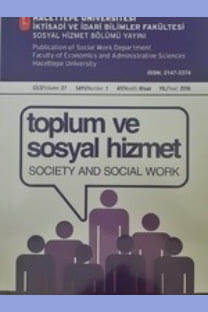Denetimli Serbestlik Sistemindeki Suça Sürüklenen Çocuk ve Gençlerin Sosyal Destek Algısı
Algılanan sosyal destek, suça sürüklenen çocuk, genç suçluluğu, denetimli serbestlik
PERCEIVED SOCIAL SUPPORT OF JUVENILE DELINQUENTS AND YOUNG OFFENDERS ON PROBATION
Perceived social support, juvenile delinquency, youth offending, probation,
___
- Akduman, A.G., Akduman, B., Cantürk, G. (2007). Investigation of the some personal and familial characteristics of juvenile delinquency. Turkish Archives of Pediatrics, 42, 156-161.
- Aksoy, A. and Ögel, K. (2007). Substance use in delinquent adolescents. Journal of addiction, 8, 11-17.
- Anderson, D.M. (2012). In school and out of trouble? The minimum dropout age and juvenile crime. Department of Agricultural Economics and Economics Montana State University.
- Baykara, A.Y. (2004). The study of life story of juveniles convicted of sexual offense and social work practice with group. PhD thesis, Hacettepe University Institute of Social Sciences Department of Social work, Ankara.
- Best, D., Hernando, R., Gossop, M., Sidwell., c., Strang, J. (2003). Getting by with a little help from your friends: the impact of peer networks on criminality in a cohort of treatment-seeking drug users. Addictive Behaviors, 28(3), 597–603.
- Bronfenbrenner, U. (1986). Ecology of the family as a context for human development: Research perspectives. Developmental Psychology, 22, 723–742.
- Danış, Z. M and Şahbikan, İ. (2014). The place and importance of social work approaches in ae-socialization process of children who have committed crime and in the context of human rights. Journal of history school, 7, 627-651.
- Duyan, V., Gelbal, S., Var, Ç.E. (2013). The adaptation study of the provision of social relations scale to Turkish. Hacettepe University Journal of Education Sciences, 44, 159-169.
- Erdoğan, F. (2010). Juvenile delinquency and socio-economical effects on juvenile delinquency. Unpublished PhD Thesis, İstanbul University Institute of Forensic Science, İstanbul.
- Farrington, D. P. (2003). Developmental and life-course criminology: Key theoretical and empirical issues – the 2002 Sutherland award address. Criminology, 41, 221–255.
- Freire, P. (2003). Pedagogy of the oppressed (4th ed). İstanbul: Ayrıntı.
- Heinz, S. (2006). Probation assistance and humanistic criminal justice. Series of Crime Policy and Comparative Contemporary Criminal Law, 380-384.
- Kierkus, C.A., and Hewitt, J.D. (2009). The contextual nature of the family structure/ delinquency relationship. Journal of Criminal Justice, 37, 123-132.
- Kunt, V. (2003). Crime and children. Ankara University Institute of Social Sciences, unpublished master’s thesis, Ankara.
- McLoyd, V. C. (1998). Socioeconomic disadvantage and child development. American Psychologist, 53(2), 185–204.
- Nijnatten, V.C. and Stevens, G. (2011). Juvenile participation in conversations with probation officers. International Journal of Offender Therapy and Comparative Criminology, 56, 483–499.
- Ögel, K. (2014). Children, crime and individualized recovery: Project of justice for children.
- Probation in Turkey Information note. (2015). General Directorate of Prisons and Detention Houses Department of Probation, Ankara.
- Rimkus, V. (2008). Aspects of social support in families of delinquent and non-delinquent children. Tiltai / Bridges, 43 (2), 75–92.
- Robins, L. (1979). Study childhood predictors of adult antisocial behavior: Replications from longitudinal studies. In: Barrett JE, Rose RM and Klerman GL (eds), Stress and Mental Disorder, 8(4), 611-622.
- Rhodes, A. (2014). Drug use and social support outcomes in probationers: a longitudinal social network analysis. Virginia Common wealth University. Retrieved from http://scholarscompass.vcu.edu.
- Rose, N. (2000). Government and control. British Journal of Criminology, 40, 321-339.
- Schwalbe, S.C. (2012). Toward and integrated theory of probation. Criminal Justice and Behaviour, 39, 185-201.
- Schwalbe, S.C. and Maschi, T. (2011). Confronting delinquency: probations officers' use of coercion and client-centered tactics to foster out compliance. Crime&Delinquency, 57, 801-810.
- Shoemaker, D.J. (2009). Juvenile delinquency. Rowman and Littlefield Publishers, Inc. Lanham. Retrieved from: https://books.google.com.tr.
- Steinberg, L., Chung, H. L. and Little, M. (2004). Reentry of young offenders from the justice system: a developmental perspective. Youth Violence and Juvenile Justice, 2 (1), 21–38.
- Şahinli, K. (2012). Çocuk suçluluğuna sebep olan ailesel faktörler: Ankara çocuk ve gençlik kapalı ceza infaz kurumunda bulunan tutuklu ve hükümlü çocuklar üzerine bir çalışma. Yüksek Lisans Tezi, Güvenlik Bilimleri Enstitüsü Ceza Adaleti Anabilim Dalı.
- Uluğtekin, S. (1991). Juveniles and resocialization. Ankara: Our Office press.
- Uluğtekin, S. (2004). Juvenile courts and social study reports. Ankara: Union of bars of Turkey.
- Van Ness, D. (2001). Introducing restorative justice. Restorative justice for juveniles: conferencing. Mediation and Circles, Oxford.
- Valente, W.T. (2003). Social network influences on adolescent substance use: an ıntroduction. Retrived from: https://www.researchgate.net.
- Vidal, S. and Woolard, J. (2017). Youth’s perceptions of parental support and parental knowledge as moderators of the association between youth-probation officer relationship and probation non-compliance. J Youth Adolesc, 46(7), 1452-1471.
- Yavuzer, H. (2004). Children and crime. İstanbul: Remzi Press,
- ISSN: 2147-3374
- Yayın Aralığı: 4
- Başlangıç: 2000
- Yayıncı: Hacettepe Üniversitesi İktisadi ve İdari Bilimler Fakültesi
SOSYAL ÇALIŞMA DİSİPLİNİNDE SOSYOLOJİK BAKIŞ AÇISININ DEĞERLENDİRİLMESİ
Bilge ASLAN AÇAN, Cengiz ÖZBESLER
Sosyal Hizmet Perspektifinden Sağlık Okuryazarlığı Müdahalelerinin Önemi
YAŞLI BAKIM UYGULAMALARINDAKİ ETİK SORUNLAR ÜZERİNE BİR DEĞERLENDİRME
ÇOCUKLUK ÇAĞI TRAVMALARININ KORUYUCU AİLE İÇİNDE SAĞALTIMI ÜZERİNE BİR DEĞERLENDİRME
SOSYAL HİZMET UZMANLARININ İŞSİZLİK DENEYİMLERİ
Sinan AKÇAY, İlke Ezgi ALPOĞLU
FİNANSAL SOSYAL HİZMET: TÜRKİYE İÇİN YENİ BİR SOSYAL HİZMET ALANI
SOSYAL HİZMET UZMANLARININ KİŞİSEL VE MESLEKİ GÜÇ ALGILARININ BAZI DEĞİŞKENLERE GÖRE İNCELENMESİ
Denetimli Serbestlik Sistemindeki Suça Sürüklenen Çocuk ve Gençlerin Sosyal Destek Algısı
